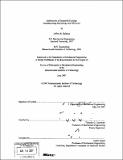Applications of industrial ecology : manufacturing, recycling, and efficiency
Author(s)
Dahmus, Jeffrey B. (Jeffrey Brian), 1974-
DownloadFull printable version (21.38Mb)
Other Contributors
Massachusetts Institute of Technology. Dept. of Mechanical Engineering.
Advisor
Timothy G. Gutowski.
Terms of use
Metadata
Show full item recordAbstract
This work applies concepts from industrial ecology to analyses of manufacturing, recycling, and efficiency. The first part focuses on an environmental analysis of machining, with a specific emphasis on energy consumption. Energy analyses of machining show that in many cases, the energy of actual material removal represents only a small amount of the total energy used in machining, as auxiliary processes can have significant energy requirements. These analyses also show that the embodied energy of the materials that are machined can far exceed the energy of machining. Such energy consumption data, along with material flow data, provide much of the information necessary to evaluate machining on the basis of environmental performance. The second part of this work focuses on material recycling at product end-of-life. In this section, a means of evaluating the material recycling potential for products is presented. This method is based on two measures: the value of the materials used in a product and the mixture of materials used in a product. This simple representation is capable of differentiating between products that are economically worthwhile to recycle and those that are not. (cont.) Such information can in turn be used to help guide product design and recycling policy. The third part of this work focuses on the effectiveness of efficiency improvements in reducing environmental impact. Historical data from ten activities show that improvements in efficiency are rarely able to outpace increases in production. Thus, the overall impact of each of these activities has increased over time. Specific conditions and policies that do allow for efficiency improvements to reduce impact are identified and explored. Together, the three topics presented here provide information, analyses, and recommendations to help move industrial systems towards sustainability.
Description
Thesis (Ph. D.)--Massachusetts Institute of Technology, Dept. of Mechanical Engineering, 2007. Includes bibliographical references.
Date issued
2007Department
Massachusetts Institute of Technology. Department of Mechanical EngineeringPublisher
Massachusetts Institute of Technology
Keywords
Mechanical Engineering.